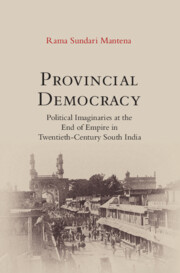Book contents
- Frontmatter
- Contents
- List of Figures
- Acknowledgements
- List of Abbreviations
- Map
- Introduction: Self-Determination, Federation, and Civil Liberties in Twentieth-Century South India
- 1 Liberalism and Anti-Colonialism in South India
- Part I Federation
- Part II Civil Liberties
- Conclusion: After Empire—Language and Regionalism
- Bibliography
- Index
3 - Princely Hyderabad, Anti-Colonialism, and Federation
Published online by Cambridge University Press: 30 April 2023
- Frontmatter
- Contents
- List of Figures
- Acknowledgements
- List of Abbreviations
- Map
- Introduction: Self-Determination, Federation, and Civil Liberties in Twentieth-Century South India
- 1 Liberalism and Anti-Colonialism in South India
- Part I Federation
- Part II Civil Liberties
- Conclusion: After Empire—Language and Regionalism
- Bibliography
- Index
Summary
By far the worst part of the Constitution is the proposed Federal structure, for it makes the feudal Indian States permanent and, in addition, given them some power to interfere in the affairs of the rest of India. The whole conception of the union of Imperialism, Feudalism and Democracy is incapable of realization, and can only mean entrenchment of all reactionary elements.
—Jawaharlal Nehru, Foreign Affairs, 1938Anti-Colonialism, Federation, and the Nation State
Jawaharlal Nehru, the charismatic leader of the anti-colonial nationalist movement in British India, published an essay entitled ‘The Unity of India’, in Foreign Affairs in 1938, to explain to Americans and other international observers what he found objectionable in the constitutional arrangement for the Government of India put forward by the British. In the essay, he argues that it was indisputable that India is diverse in its peoples, cultures, religions, class, and castes and that this diversity posed a great challenge for the nationalist movement. This, in itself, was not surprising, he acknowledges to a global audience. He further suggests that the INC was aware that they would need to manage that diversity in making a case for self-government and independence to be accepted into a world of nations. However, what was worth noting, he writes, is that the socio-economic conditions of British India, as well as the political divisions, were created by the British over a century of colonial rule. The problems facing India were not due to Indian particularities but rather a ‘monstrous imposition’ as the Bombay Chronicle reported in January 1938 on Nehru and Edward J. Thompson’s views. The article documents Nehru's opposition to federation and his decrying that it was an impossible solution if a constitutional arrangement is meant to bring out a union of ‘Imperialism, Feudalism and Democracy’. While the British proclaimed that they brought a kind of political unity to India, Nehru was clearly seeking to highlight how colonial rule actually brought about stagnation, especially so in the uneven political geography of early-twentieth-century South Asia.
Even the political ‘unity’ the British proclaimed they brought to the subcontinent had an uneven history, as Kavita Datla has recently argued. She writes:
The parceling of sovereign rights was not an accidental outcome of the Company's military endeavors, nor was it simply a reflection of the way things had to be.
- Type
- Chapter
- Information
- Provincial DemocracyPolitical Imaginaries at the End of Empire in Twentieth-Century South India, pp. 104 - 134Publisher: Cambridge University PressPrint publication year: 2023



